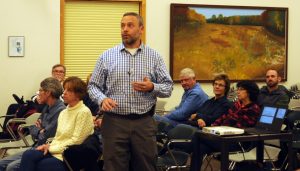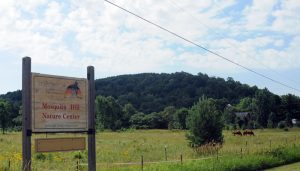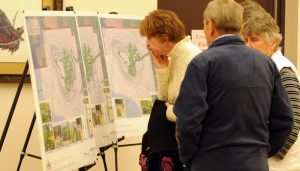County accepting feedback through Dec. 31
By Scott Bellile
Campsites, zip-lines and bike trails could be coming to Mosquito Hill Nature Center.
Those are among the options proposed by a landscape architecture consulting firm.
The Outagamie County Parks System is planning its capital projects list for outdoor improvements at the 441-acre nature center over the next 10 to 20 years.
John Kneer, president of the Stevens Point-based master planning firm Rettler Corporation, presented three conceptual layouts for the nature center’s outdoor spaces at a Nov. 12 public input meeting at the nature center.
Outagamie County invites anyone, including people who did not attend last month’s meeting, to view the concepts on the county’s website and submit feedback by the end of the year. The county will consider implementing the amenities and enhancements in the future as funding and resources become available.
At last month’s meeting, Kneer said 250 people responded to a recent questionnaire regarding what they wish to see added to the nature center. The top results included:
• Viewing platform or observation tower on top of the hill (13 percent).

Scott Bellile photo
• More trails (10 percent).
• Sledding hill (8 percent).
• New native habitat areas (8 percent).
• A tree canopy walkway on top of the hill (6 percent).
• A nature-based school (6 percent).
• Mountain biking trails (6 percent).
• Low-impact camping facilities (6 percent).
Rettler Corporation used the public’s earlier feedback to develop the three concept options for the nature center.
Proposed additions
Most additions would occur on the 11-acre property on the southeast side of the hill that the nature center purchased from the Kamps estate this year.
The ideas Kneer presented include:
• A boardwalk over the Wolf River: The boardwalk could include an observation deck and workspace for classes.
• A visitors’ center with restrooms and showers: The former Kamps house would be demolished because the facility does not meet accessibility standards. Some materials from the structure could be reused in the visitors’ center.
• Drive-in campsites and rustic camping areas: Sites would be geared toward tent camping, not RVs.
• A pavilion: This could be rented out for retreats and weddings.

Scott Bellile file photo
• Observation tower: For an aerial view of the nature center.
• Canopy walk: For exploring treetops.
• Zip-line platforms: Three zip-line runs with drops averaging 30 feet.
• Single-track mountain bike trails: Three difficulty options ranging from easy to difficult.
• Amphitheater: For outdoor lectures and music.
• High ropes adventure course.
• Sledding hill.
• Additional walking trails.
• Picnic areas.
Patrons give feedback
Kneer asked attendees for their input.
New London resident Julie Blohm raised concerns over the proposed uses for the former Kamps property.
“I was always under the understanding this was a nature preserve, nature center, where I could go to have quiet, peace, solitude, see the animals,” Blohm said. “And now I’m hearing sledding, zip-lining, mountain biking. And to me, that’s gearing towards amusement park, and the noise that I just don’t want to deal with when I’m out to a quiet place.”
Kneer said he believes such activities would not be any more disruptive than the low-impact interactions already offered to tour groups.

Scott Bellile photo
“You’re not going to have the wild party atmosphere,” Kneer said. “That’s not what it’s going to attract.”
New London resident and cyclist Tammy Vanevenhoven said in her experiences biking Hartman Creek State Park, riders and their families treat nature respectfully and peacefully.
“I think there can be a misconception of cycling that is a lot of craziness, a lot of noise,” Vanevenhoven said. “And really, it would not be that way at all. It’s actually the exact opposite. So because of the rugged terrain, it’s going to slow people down. It’s not going to be something where people are going to be racing to speed through those trails.”
Dave Wuebben, president of the Friends of Mosquito Hill Board of Directors, said an activity like zip-lining could generate excitement for the nature center.
“I’m thinking, holy cow, you put a zip-line out here – and I’m not necessarily a big fan – but you add that to a field trip for the kids, and you will start to get a lot of school groups out here,” Wuebben said.
“Even in the case of a zip-line, the whole goal is to get people in nature, and that zip-line accomplishes that,” Outagamie County Parks Director Loren Dieck said. “It’s not about party, adventure, that type of thing. It’s about enjoying nature in a different capacity.”
Current usage
During the November meeting, Kneer also presented other results from the questionnaire concerning how people use the nature center and what existing features they would like to see improved.
Half of respondents indicated they rarely used the nature center in the past year. The other half said they visited frequently.
Of the frequent visitors, half attended an event. The most popular events were the Harvest Moon Festival, adult learning programs and workshops, Winter Family Fun Day and Honey Sunday.
Nature center users said the most important facilities to them are the hiking and walking trails and the restrooms.
They also ranked highly the indoor offerings, which include the hands-on displays, natural history exhibits, gift shop and meeting rooms.
However, the indoor facilities are not included in the county’s master plan. The Friends of Mosquito Hill group is leading a fundraising campaign to upgrade those separately.
Concerning improvements, the most respondents – about a fifth of them – said they want to see the native habitat areas enhanced. The indoor educational displays ranked No. 2.
Improving the existing trails came in third. Respondents indicated they want the trails expanded farther and made more accessible to people with disabilities.
